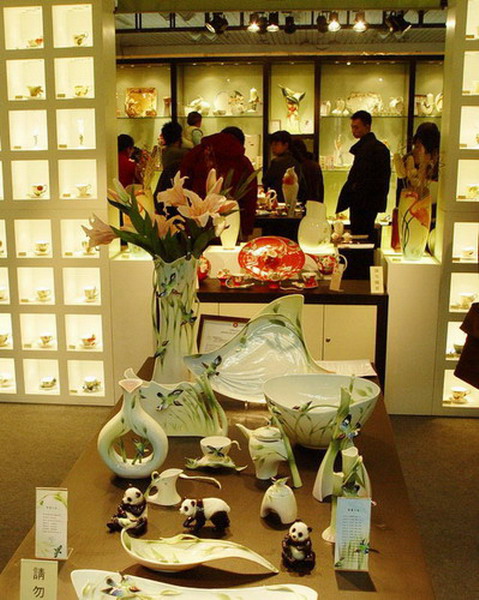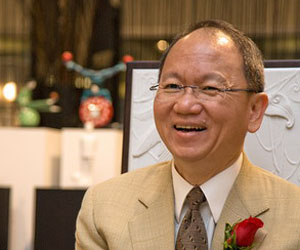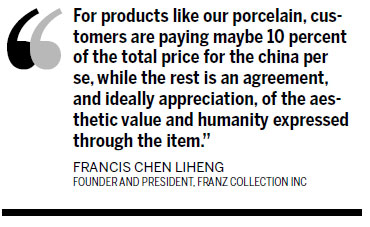Porcelain maker's China ambition
Updated: 2012-05-10 11:18
By Xu Junqian in Shanghai (China Daily)
|
||||||||
|
 A chinaware exhibition held in Beijing. High-quality chinaware works are regarded as decent gifts throughout the world. [Photo/China Daily]
|
Chen Liheng is keen for his Franz Collection to be as admired as Wedgewood's
Francis Chen Liheng has never spent a penny advertising his wares but the founder and president of Franz Collection Inc doesn't really need to worry about his stock not shifting.
|
 Francis Chen Liheng, founder and president of Franz Collection Inc. |
Drop-in customers who have heard about him through word of mouth include former US president Bill Clinton, Kuomintang Chairman Ma Ying-jeou, and a galaxy of world-famous celebrities including Barbra Streisand and Elton John.
"What I am selling is culture," said the 61-year-old chinamaker who described his 3,000 yuan ($480) tea set and vases that mostly feature rich colors and exquisite relief as a combination of "Eastern aesthetics and Western art nouveau".
After spending more than 10 years filling showcases with his chinaware in world-famous department stores and fine gift shops that were dominated by names such as Japan's Noritake, Germany's Meissen and Britain's Wedgewood, Chen is ambitious to move upward on the global showcase, becoming the world's top china producer.
The Taiwan native believes that to achieve his goal he should return to the Chinese mainland, the home of his produce.
"I doubt that anybody would be drinking Coca-Cola and watching Hollywood movies if Americans per se don't. A brand must be supported by the culture and social network in which it is rooted and that's why I am coming back," said Chen.
Like hundreds of original equipment manufacturers and original design manufacturers in Taiwan, a world powerhouse for products ranging from baby carriages to Christmas lights and computers, Chen made his fortune in the 1990s by manufacturing for a galaxy of world's top gift producers including the US company Legend.
In 2001, "the king of gift OEM" decided to do something more than just accumulate wealth. He began manufacturing and designing a brand of his own, the Franz Collection, named after his English name Francis.
"If there is one thing we Chinese should be good at making and selling, it is the chinaware named after our nation," said Chen, who majored in German at Taiwan Fu Jen University, and is a learned master of Confucianism, Buddhism and Taoism.
|
 |
Known as the fifth invention of China, porcelain, a ceramic made by heating raw materials generally consisting of clay in the form of kaolin, used to enjoy high esteem among European aristocrats since it was first shipped there in the late 13th century. King Augustus II the Strong of Poland, for example, once traded a troop of 600 elite soldiers for 150 porcelain temple jars.
Industrious attempts to reproduce what had been termed "white gold", however, quickly outshone Chinese porcelain in the following centuries in Europe, which led to the creation of the current top china brands such as Meissen and later Wedgewood, leaving the original a limited presence in the market.
"It's just like the Chinese copying LV bags today. What is pathetic is that we don't have any original 'LV china' anymore," said Chen.
While it remains "unaffecting" for Chen if Franz becomes the latter day LV china, the company has earned quite a place in Europe and the United States.
One year after the brand was established and headquartered in the US, it was recognized at the 2002 New York International Gift Fair with the Best in Show award, which Chen believed is a "golden stepping stone" for the company to expand in the overseas market.
Since then, chinaware with the logo of a seagull and the blue-inked "Franz" has quickly garnered a total of 6,000 point-of-sales outlets in 56 countries and regions including US luxury store Saks Fifth Avenue.
Although Chen declined to reveal any information about company revenues, saying it is still a family business, and he doesn't want to "invite competitors by depicting what a lucrative market it is", it is true to say the company has been enjoying "double-digit growth" throughout the past decade, even during the global economic recession in 2008, which led to centuries-old brands such as the Anglo-Irish Wedgewood suffering severe financial difficulties.
In China, where it now has almost 150 retail stores, the company's sales have increased at a speed of 40 percent every year. It has been one of the biggest, if not the biggest, gift sellers both in terms of store numbers and revenue in domestic department stores.
The secret of its success, apart from abundant experience in original equipment manufacturing, is "an integration of Chinese aesthetics and state-of-the-art technique", Chen said.

 Relief reaches isolated village
Relief reaches isolated village
 Rainfall poses new threats to quake-hit region
Rainfall poses new threats to quake-hit region
 Funerals begin for Boston bombing victims
Funerals begin for Boston bombing victims
 Quake takeaway from China's Air Force
Quake takeaway from China's Air Force
 Obama celebrates young inventors at science fair
Obama celebrates young inventors at science fair
 Earth Day marked around the world
Earth Day marked around the world
 Volunteer team helping students find sense of normalcy
Volunteer team helping students find sense of normalcy
 Ethnic groups quick to join rescue efforts
Ethnic groups quick to join rescue efforts
Most Viewed
Editor's Picks

|

|

|

|

|

|
Today's Top News
Health new priority for quake zone
Xi meets US top military officer
Japan's boats driven out of Diaoyu
China mulls online shopping legislation
Bird flu death toll rises to 22
Putin appoints new ambassador to China
Japanese ships blocked from Diaoyu Islands
Inspired by Guan, more Chinese pick up golf
US Weekly

|

|






